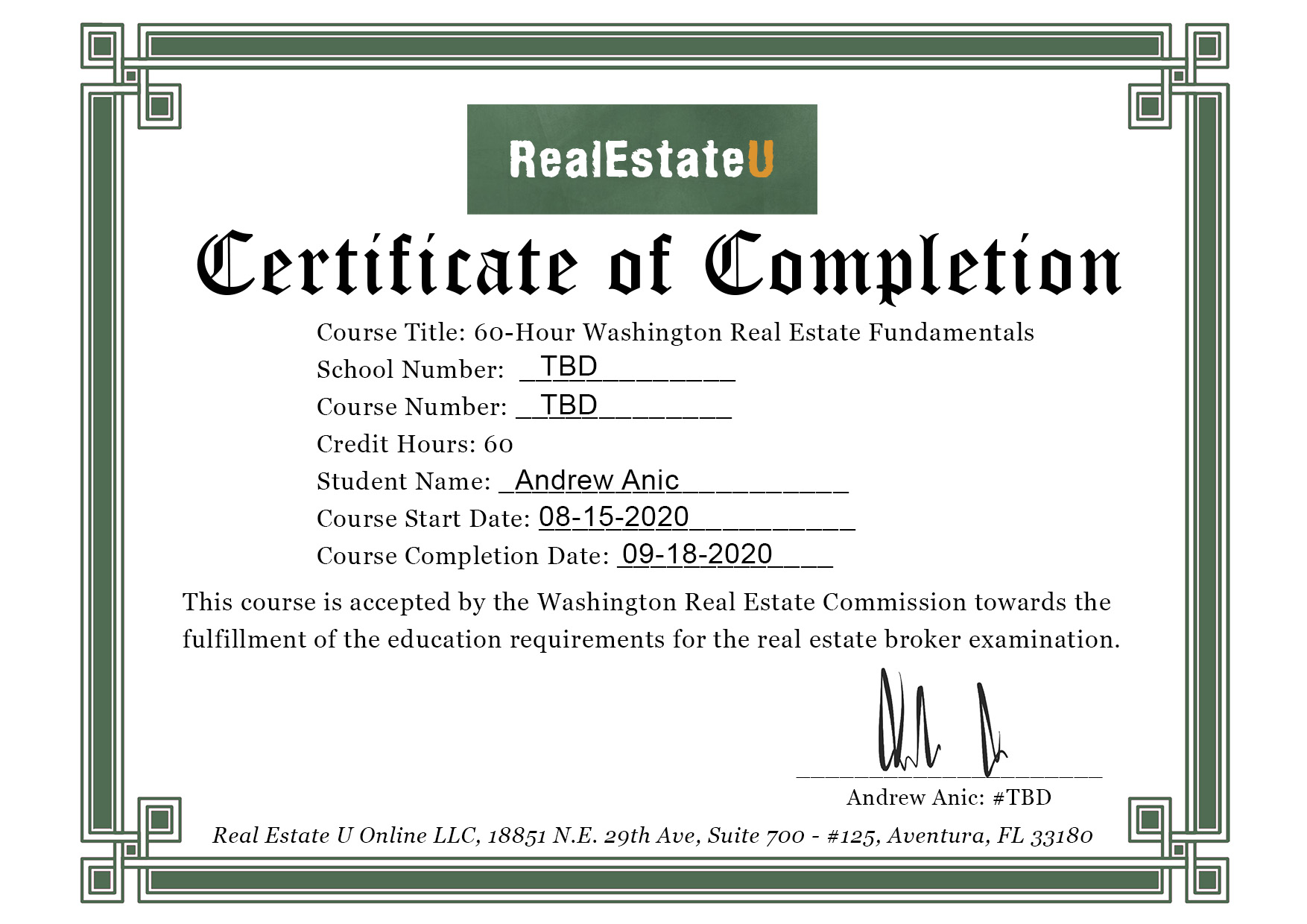
To obtain a Colorado real estate license, you will need to submit your fingerprints for a national and state criminal history record check. This can be done at any stage of your application. No special certificate is required to get your fingerprints. They can be submitted at any state-approved IdentoGO fingerprint facility. You should inform the location that you are applying for a real estate license in order to let them know you will be there.
Obtaining a real estate license in Colorado
Getting a real estate license in Colorado is not hard - you just need to follow some steps. Make sure you have current insurance for errors-and-omissions and fingerprints. These policies can cover any type or liability related to real estate. Colorado also requires that you purchase a professional liability insurance policy. E&O insurance, which is required by Colorado brokers, is a good idea for independent workers.

It is easy to apply. You will need to submit certain documents and create an account on DORA's website. Once your account is created, you can submit an application and pay the fees. You will need to pay $485 to apply. $485 is required to apply for a Colorado real-estate license. You must pass a criminal background screening to ensure that your application is approved.
Exam requirements
Certain conditions must be met before you can sit for the Colorado real estate licensing exam. If you are convicted of a crime, you cannot be licensed to sell Colorado real estate. If you've been convicted of a felony, you must submit your fingerprints to the Colorado Bureau of Investigation. To conduct background checks on potential agents for real estate, fingerprints will be used. You also need to be covered by errors and omissions insurance.
Before taking the exam, applicants must have attained 18 years of age and passed a background screening. The license is valid for a period of two years. However, you will need another exam to continue your career in the real-estate industry. You are also required to continue education every two years by the state. If you don't have the right education, it can be difficult. At least 162 hours should be completed in coursework to pass Colorado's real estate exam.
E&O insurance requirements
Colorado realty license applicants are required to obtain errors and omissions (E&O), Insurance. Brokers are protected from lawsuits by obtaining errors and omissions insurance. It also helps to pay court costs and settlements. Without E&O insurance, facing a lawsuit can be financially devastating and ruin a career. Apply for E&O insurance through your brokerage to avoid financial ruin.

Colorado real-estate license applicants must submit fingerprints for eligibility for E&O insurance policies. These fingerprints will serve as fingerprint-based criminal background checks. E&O insurance covers the professional liability of agents in case of negligence. It is vital that license applicants have E&O insurance before applying to Colorado real estate license.
FAQ
Should I buy or rent a condo in the city?
Renting could be a good choice if you intend to rent your condo for a shorter period. Renting allows you to avoid paying maintenance fees and other monthly charges. You can also buy a condo to own the unit. You are free to make use of the space as you wish.
How can I eliminate termites & other insects?
Over time, termites and other pests can take over your home. They can cause serious destruction to wooden structures like decks and furniture. It is important to have your home inspected by a professional pest control firm to prevent this.
What is a Reverse Mortgage?
A reverse mortgage lets you borrow money directly from your home. It allows you access to your home equity and allow you to live there while drawing down money. There are two types of reverse mortgages: the government-insured FHA and the conventional. A conventional reverse mortgage requires that you repay the entire amount borrowed, plus an origination fee. FHA insurance covers repayments.
Is it cheaper to rent than to buy?
Renting is usually cheaper than buying a house. However, renting is usually cheaper than purchasing a home. You also have the advantage of owning a home. You will have greater control of your living arrangements.
How do I fix my roof
Roofs may leak from improper maintenance, age, and weather. Roofing contractors can help with minor repairs and replacements. Contact us for further information.
How much will my home cost?
The number of days your home has been on market and its condition can have an impact on how much it sells. The average selling price for a home in the US is $203,000, according to Zillow.com. This
Statistics
- Private mortgage insurance may be required for conventional loans when the borrower puts less than 20% down.4 FHA loans are mortgage loans issued by private lenders and backed by the federal government. (investopedia.com)
- 10 years ago, homeownership was nearly 70%. (fortunebuilders.com)
- It's possible to get approved for an FHA loan with a credit score as low as 580 and a down payment of 3.5% or a credit score as low as 500 and a 10% down payment.5 Specialty mortgage loans are loans that don't fit into the conventional or FHA loan categories. (investopedia.com)
- When it came to buying a home in 2015, experts predicted that mortgage rates would surpass five percent, yet interest rates remained below four percent. (fortunebuilders.com)
- Based on your credit scores and other financial details, your lender offers you a 3.5% interest rate on loan. (investopedia.com)
External Links
How To
How to find an apartment?
When moving to a new area, the first step is finding an apartment. This process requires research and planning. It involves research and planning, as well as researching neighborhoods and reading reviews. This can be done in many ways, but some are more straightforward than others. These are the steps to follow before you rent an apartment.
-
It is possible to gather data offline and online when researching neighborhoods. Online resources include Yelp. Zillow. Trulia. Realtor.com. Offline sources include local newspapers, real estate agents, landlords, friends, neighbors, and social media.
-
See reviews about the place you are interested in moving to. Review sites like Yelp, TripAdvisor, and Amazon have detailed reviews of apartments and houses. You may also read local newspaper articles and check out your local library.
-
To get more information on the area, call people who have lived in it. Ask them about what they liked or didn't like about the area. Ask them if they have any recommendations on good places to live.
-
Check out the rent prices for the areas that interest you. Renting somewhere less expensive is a good option if you expect to spend most of your money eating out. You might also consider moving to a more luxurious location if entertainment is your main focus.
-
Find out all you need to know about the apartment complex where you want to live. What size is it? How much does it cost? Is it pet friendly? What amenities do they offer? Do you need parking, or can you park nearby? Are there any special rules that apply to tenants?